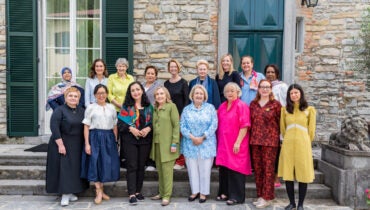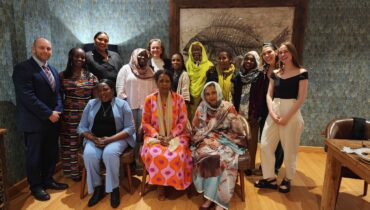The Georgetown Institute for Women, Peace and Security hosted a virtual panel discussion, “Caught in the Crossfire: Sudanese Women’s Struggle for Peace”, to raise awareness and offer solutions to the ongoing crisis in Sudan, which in five months has already displaced more than five million people.
On April 15, 2023, violence erupted between Sudan’s army and the paramilitary group Rapid Support Forces (RSF). Since then, mass atrocities against civilian targets have surged. Women, girls, and vulnerable communities are being disproportionately impacted through the brutal and widespread use of conflict-related sexual violence. Reports of ethnically targeted rape, sexual assault, and trafficking are extremely disturbing. The violence in Darfur, a western region in Sudan, is reminiscent of the genocide which began 20 years ago. However, Sudanese women remain resilient. Having long led the fight for a free and just Sudan, they continue to work, at great personal risk, for a better future.
The discussion featured remarks from Ambassador Monica Juma, National Security Advisor to the President of Kenya; Safaa Adam, President of Community Development for Sudan; Hala Al-Karib Regional Director for Strategic Initiative for Women in the Horn of Africa (SIHA); Adjaratou Fatou Ndiaye, UN Women Country Representative in Sudan; and Dr. Mohamed Eisa, Secretary General of the Sudanese American Physicians Association.
“What’s happening to Sudan at the moment, and what Sudanese women are experiencing, is not something that’s happening in a vacuum. This violence is definitely based on decades of impunity accommodating sexual violence and other forms of violence against women and girls,” said Al-Karib whose organization has been documenting horrific cases of sexual violence since the conflict began.
While there were several topics discussed, one key theme emerged during the event: women must be involved in ending the violence and in any future peace processes.
“We must insist and ensure that women’s engagement happens where the difference will be made,” said Ambassador Juma, who works alongside President William Ruto of Kenya to try and negotiate a ceasefire in Sudan.
“It’s really important to involve women in any political process. Our narrative, our agenda: what does peace mean to us? What does accountability mean to us?” echoed Al-Karib.
Sudanese leaders saw the impact of women’s voices in 2019 during a women-led nonviolent revolution. The revolution was interrupted by a military coup, but carried a lasting impact.
“Women’s groups and youth resistance committees were instrumental in the change that led to the nonviolent revolution in December 2019,” said Adam, who joined the event virtually from Sudan.
Despite their leadership in Sudan’s revolution in 2019, women and civil society groups have largely been shut out of efforts to negotiate a peace and put Sudan back on a path toward democratic transition.
In addition to providing an overview of a complex crisis replete with mass atrocities and a desperate humanitarian situation, the speakers gave several key recommendations for the international community.
- Prioritize women’s engagement in all future peace processes: In all future peace processes– whether hosted in Jeddah, by the African Union, or the Intergovernmental Authority on Development (IGAD)–women, youth, and other civil society groups must be consulted with and have a role to play.
- Establish a formal mechanism to document mass atrocities and human rights abuses: Either through a Commission of Inquiry or an independent monitoring mechanism, the United Nations must establish a formal process to monitor and document mass atrocities and human rights violations. This is a first step towards ensuring perpetrators are held accountable for their crimes through a future justice mechanism. Additional support is needed to train local civil society organizations on best practices for documentation to support the gathering of evidence.
- Step up the pressure on the warring parties to end the conflict and violence against civilians: Governments must exert more pressure on the Sudanese Armed Forces and Rapid Support Forces to end this conflict, end violence against women, and end mass atrocities. Additional sanctions that cut off the financial incentives to continue this war are needed to bring the two sides to the negotiating table.
- Increase humanitarian aid: The international community must increase humanitarian aid to medical facilities, paying special attention to gender-sensitive aid to support victims of sexual violence and women’s health. Additional humanitarian assistance is needed to support refugees and IDPs fleeing the violence.
The crisis in Sudan is ongoing, and the effect of war and targeted violence against civilians is grave. The international community must step up to bring this conflict to an end, hold perpetrators of mass atrocities accountable, and support a path to a durable peace. The way forward must see women’s and civil society inclusion at the highest levels of peace negotiations and accountability for human rights abuses.
“We must insist that, whether hostilities cease or not, there must be a responsibility to respect international humanitarian law,” said Amb. Monica Juma, National Security Advisor to the President of Kenya. “There must be protection of civilians, there must be protection particularly of women and children.”
The event was cosponsored by the Center for Contemporary Arab Studies and the School of Foreign Service African Studies Program and took place on September 6, 2023.


